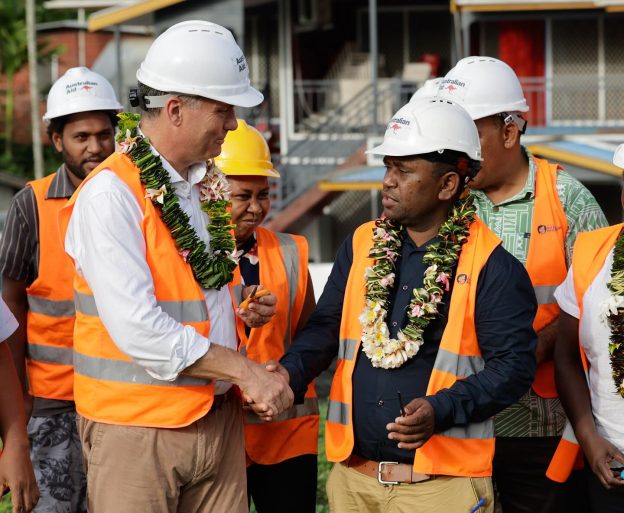Written by: (Contributed) on 17 June 2024
(Above; Marles in Honiara at Australian ad project. Photo: Richard Marles MP Facebook)
Diplomatic statements invariably reveal far more than they contain; the recent high-level visit by Deputy Prime Minister Richard Marles to Honiara proved no exception to the general rule. Timed to coincide with the establishment of a new Solomon Island's government, the diplomacy highlighted the strategic significance of the small South Pacific country for Australia's specific Cold War military and security considerations and general 'US interests'.
Another important factor, however, was not an open agenda item, although it can be regarded as a serious consideration for Australian diplomacy following a recent US global directive to allies when dealing with relations with China.
In late May, Australian deputy-prime minister Richard Marles made a high-level diplomatic visit to the Solomon Islands to meet the incoming prime minister in Honiara, Jeremiah Manele. It was explained in an official media release as 'Australia seizes the opportunity for a relationship reset with the South Pacific's most pro-China nation'. (1) Diplomatic relations between the two countries have proven problematic following a decision by then Solomons' prime minister Manasseh Sogavare to switch from diplomatic recognition of Taiwan to China in 2019.
Subsequent high-level diplomacy between Honiara and Beijing included fears being raised in Canberra of China being able to move at random in the South Pacific country, which has long been used by Australian military planners as a base for projecting influence in the region. Traditional Australia-Solomon Islands diplomacy has been conducted along neo-colonial lines. The challenge presented by China has, therefore, been assessed as a serious problem for Canberra.
A diplomatic statement issued by Canberra noted 'it is a new government that has been formed there. We want to be there very much at the start to talk about how we can take our bilateral relationship to the next step'. (2)
While Canberra openly greeted the demise of the Sogavare administration, little, however, has changed, or will do so. The new Manele government is unlikely to change political course; Sogavare is also the new Finance Minister. A prompt media release from Honiara accompanying the high-level Australian diplomacy noted 'Australia and China as equally important partners for Solomon Islands … its security agreement with Beijing will remain'. (3)
Elsewhere, however, another statement issued earlier noted the new government and 'its Look North policy, embraced by Manele, says the Solomon Islands' economic future depends upon China, rather than its traditional partners like Australia'. (4) It followed recognition that 'Manele is committed to maintaining his country's China-friendly policies … China is already deeply enmeshed in the country's political fabric'. (5)
The Solomon Islands is a desperately poor country; its 800,000 population live on six major islands, with over nine hundred smaller landmasses. Since achieving independence from the Australian colonial administration in 1976, little meaningful economic development has taken place since that time. Per capita GDP remains at about $600 pa, with more than 75 per cent of the population employed in subsistence agriculture.
The Solomon Islands is dependent upon foreign aid which, invariably, arrives with strings. Some of this is not considered particularly problematic by the Solomon Islands.
Serious studies have concluded 'the neo-liberal framework within which Australia has engaged with the region has not delivered optimal social outcomes. Why would it, given its track records? … Chinese aid is attractive to the Solomon Islands because it largely stays in the Solomon Islands; Australian aid does not … it … is a form of boomerang aid that simply returns to Australia … Australia was the largest direct recipient of its own aid funding'. (6)
Australia, therefore, has difficult diplomatic relations with the Solomon Islands. In fact, it has been noted that 'Australia is at the cross-hairs of this big shift. It is frozen out by Beijing which is also making a power play in the Pacific islands … that's why the Solomon Islands matters … China has surpassed Australia in terms of two-way trade with Pacific islands nations'. (7)
Accompanying the recent high-level diplomatic visit from Canberra to Honiara, a brief media release was issued from Washington, about US foreign policy initiatives to deal with China. It contained information about the Biden administration raising tariffs on Chinese exports and a request that allies should do likewise to ensure the success of the US-led trade war diplomatic position. (8) Washington has embarked upon classic Cold War diplomatic initiatives 'as a critical way to isolate Beijing on the global stage'. (9)
Due to Australia's close diplomatic links with Washington, it would be almost unthinkable that Canberra would not also follow suit. It is obliged to do so with usual diplomatic protocol.
The US agenda item did not, however, form part of the stated reason why Australia's diplomatic relations with the Solomon Islands were seemingly being re-booted afresh, although would appear the main factor explaining why such a senior government figure travelled to Honiara: Marles, is also Minister for Defence, diplomacy is usually conducted through Foreign Affairs;
We need an independent foreign policy!
1. Marles' diplomatic dash to Solomons, Australian, 21 May 2024.
2. Ibid.
3. Ibid.
4. PM hails new Solomon Islands leader, Australian, 3 May 2024.
5. Ibid.
6. Sub-Imperial Power – Australia in the International Arena, Clinton Fernandes, (Victoria, 2022), pp. 94-97.
7. As the Solomon Islands heats up, SBS News, 28 November 2021.
8. US seeks EU support in trade war, Australian, 23 May 2024.
9. Ibid.


No comments:
Post a Comment